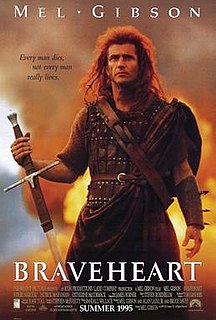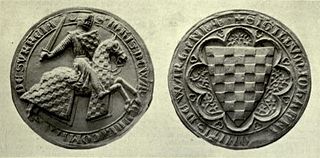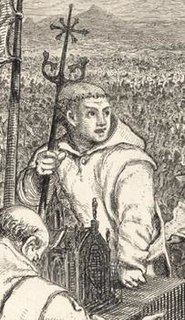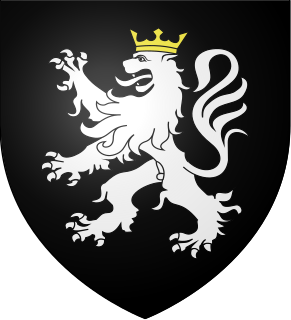| |||||
| Centuries: | |||||
|---|---|---|---|---|---|
| Decades: | |||||
| See also: | List of years in Scotland Timeline of Scottish history 1305 in: England • Elsewhere | ||||
Events from the year 1305 in the Kingdom of Scotland .
| |||||
| Centuries: | |||||
|---|---|---|---|---|---|
| Decades: | |||||
| See also: | List of years in Scotland Timeline of Scottish history 1305 in: England • Elsewhere | ||||
Events from the year 1305 in the Kingdom of Scotland .

Braveheart is a 1995 American historical drama film directed and co-produced by Mel Gibson, who portrays Sir William Wallace, a late-13th-century Scottish warrior. The film depicts the life of Wallace leading the Scots in the First War of Scottish Independence against King Edward I of England. The film also stars Sophie Marceau, Patrick McGoohan and Catherine McCormack. The story is inspired by Blind Harry's 15th century epic poem The Actes and Deidis of the Illustre and Vallyeant Campioun Schir William Wallace and was adapted for the screen by Randall Wallace.

Robert I, popularly known as Robert the Bruce, was King of Scots from 1306 to his death in 1329. Robert was one of the most famous warriors of his generation and eventually led the Kingdom of Scotland during the First War of Scottish Independence against England. He fought successfully during his reign to regain Scotland's place as an independent country and is now revered in Scotland as a national hero.

Sir William Wallace was a Scottish knight who became one of the main leaders during the First War of Scottish Independence.

The Wars of Scottish Independence were a series of military campaigns fought between the Kingdom of Scotland and the Kingdom of England in the late 13th and early 14th centuries.

John Balliol, known derisively as Toom Tabard, was King of Scots from 1292 to 1296. Little is known of his early life. After the death of Margaret, Maid of Norway, Scotland entered an interregnum during which several competitors for the Crown of Scotland put forward claims. Balliol was chosen from among them as the new King of Scotland by a group of selected noblemen headed by King Edward I of England.

The Battle of Falkirk, which took place on 22 July 1298, was one of the major battles in the First War of Scottish Independence. Led by King Edward I of England, the English army defeated the Scots, led by William Wallace. Shortly after the battle Wallace resigned as Guardian of Scotland.
John Comyn III of Badenoch, nicknamed the Red, was a leading Scottish baron and magnate who played an important role in the First War of Scottish Independence. He served as Guardian of Scotland after the forced abdication of his uncle, King John Balliol, in 1296, and for a time commanded the defence of Scotland against English attacks. Comyn was stabbed to death by Robert the Bruce before the altar at the church of the Greyfriars at Dumfries.

Elderslie is a village in the council area and historic county of Renfrewshire in west central Scotland. It chiefly serves as a commuter village, situated midway between the towns of Paisley and Johnstone, and lies 11 miles (18 km) west of Glasgow city centre.

John de Warenne, 6th Earl of Surrey was a prominent English nobleman and military commander during the reigns of Henry III of England and Edward I of England. During the Second Barons' War he switched sides twice, ending up in support of the king, for whose capture he was present at Lewes in 1264. Warenne was later appointed a Guardian of Scotland and featured prominently in Edward I's wars in Scotland.

Scottish nationalism promotes the idea that the Scottish people form a cohesive nation and national identity.

The First War of Scottish Independence was the first of a series of wars between English and Scottish forces. It lasted from the English invasion of Scotland in 1296 until the de jure restoration of Scottish independence with the Treaty of Edinburgh–Northampton in 1328. De facto independence was established in 1314 at the Battle of Bannockburn. The wars were caused by English kings attempting to establish their authority over Scotland while Scots fought to keep English rule and authority out of Scotland.

David Robertson Ross was a Scottish author and historian. He published eight books, most of them mixing elements of Scottish history and travel literature.

William de Lamberton, sometimes modernized as William Lamberton, was Bishop of St Andrews from 1297 until his death. Lamberton is renowned for his influential role during the Scottish Wars of Independence. He campaigned for the national cause under William Wallace and later Robert the Bruce. As Bishop of St Andrews, the most powerful seat in Scotland, Bishop Lamberton along with Bishop Robert Wishart of Glasgow conducted the coronation of Robert the Bruce as King Robert I. Lamberton would go on to have a vital role in the formulation of the Declaration of the Clergy 1310 and the Declaration of Arbroath which would lead to Scottish Independence.

New Cumnock is a town in East Ayrshire, Scotland. It expanded during the coal-mining era from the late 18th century, and mining remained its key industry until its pits were shut in the 1960s. The town is 5.7 miles (9.2 km) south-east of Cumnock, and 21 miles (34 km) east of Ayr.
Events from the 1300s in England.
Events from the 1290s in England.

John Segrave, 2nd Baron Segrave was an English commander in the First War of Scottish Independence.

Sir John Menteith of Ruskie and Knapdale was a Scottish nobleman during the Wars of Scottish Independence. He is known for his capture of Sir William Wallace in 1305 and later joined with King Robert I of Scotland and received large land grants in Knapdale and Kintyre for his service. He is described as "guardian" of the Earldom of Menteith, as his great-nephew Alan II, Earl of Menteith was a minor at the time of the death of Alan I, Earl of Menteith.

Clan Little is a Scottish clan of the Borders. The clan does not currently have a chief and is therefore considered an armigerous clan. The Clan Little Society had a Guardian in place of a clan chief but, since his death in 2007, no suitable successor has appeared.
The Rescissory Act, 1661 or Act rescinding and annulling the pretended parliaments in the years 1640, 1641 etc. was added to the Scottish Parliamentary register on the 28 March 1661. At one stroke, it annulled the legislation of 1640–1648, covering the time of the Wars of the Three Kingdoms and the Commonwealth. This parliament was sometimes known disparagingly as the "Drunken Parliament".